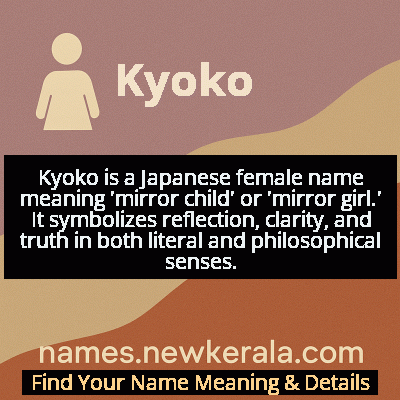Kyoko Name Meaning & Details
Origin, Popularity, Numerology Analysis & Name Meaning of Kyoko
Discover the origin, meaning, and cultural significance of the name KYOKO. Delve into its historical roots and explore the lasting impact it has had on communities and traditions.
Name
Kyoko
Gender
Female
Origin
Japanese
Lucky Number
5
Meaning of the Name - Kyoko
Kyoko is a Japanese female name meaning 'mirror child' or 'mirror girl.' It symbolizes reflection, clarity, and truth in both literal and philosophical senses.
Kyoko - Complete Numerology Analysis
Your Numerology Number
Based on Pythagorean Numerology System
Ruling Planet
Mercury
Positive Nature
Adventurous, dynamic, curious, and social.
Negative Traits
Restless, impatient, inconsistent, prone to indulgence.
Lucky Colours
Green, white.
Lucky Days
Wednesday.
Lucky Stones
Emerald.
Harmony Numbers
1, 3, 9.
Best Suited Professions
Sales, marketing, travel, entertainment.
What People Like About You
Versatility, charisma, adventurous spirit.
Famous People Named Kyoko
Kyoko Kagawa
Actress
Renowned Japanese film actress known for her roles in classic films by directors like Akira Kurosawa and Yasujirō Ozu
Kyoko Iwasaki
Swimmer
Olympic gold medalist in the 200m breaststroke at the 1992 Barcelona Olympics, becoming Japan's youngest Olympic swimming champion at age 14
Kyoko Fukada
Actress, Singer
Popular Japanese actress and singer known for roles in films like 'Kamikaze Girls' and television dramas, winning multiple acting awards
Kyoko Koizumi
Actress, Singer
Influential Japanese actress and singer with a career spanning decades, known for her versatile performances in film and television
Name Variations & International Equivalents
Click on blue names to explore their detailed meanings. Gray names with will be available soon.
Cultural & Historical Significance
Historically, names containing 'kyō' (mirror) were particularly valued during the Heian period when court culture emphasized refinement and self-awareness. The mirror motif in Japanese culture extends beyond literal reflection to encompass introspection, clarity, and the concept of 'kagami' as a metaphor for the human heart and its capacity for truth. This makes Kyoko a name that carries centuries of cultural wisdom about self-knowledge and authenticity in Japanese society.
The name also reflects the Japanese aesthetic principle of 'mono no aware' - the awareness of impermanence and gentle sadness at life's transience, as a mirror captures fleeting moments. This philosophical depth, combined with its elegant sound, has made Kyoko an enduring choice that represents both cultural tradition and personal refinement.
Extended Personality Analysis
Women named Kyoko are often perceived as reflective, intuitive, and possessing strong self-awareness, living up to their name's mirror symbolism. They tend to be observant individuals who carefully consider situations before acting, often serving as truthful reflectors of reality in their relationships and professional lives. Their reflective nature makes them excellent listeners and advisors, as they can objectively mirror others' thoughts and feelings back to them with clarity and honesty.
Kyokos typically exhibit a balanced combination of traditional values and modern adaptability. They often demonstrate reliability and consistency in their actions, much like a clear mirror provides an accurate reflection. While they may appear reserved initially, they possess deep emotional intelligence and the ability to understand multiple perspectives. Their mirror-like quality enables them to adapt to different social situations while maintaining their core identity, making them valued friends and colleagues who bring clarity and truth to any environment.
This name often correlates with individuals who have strong analytical skills and the capacity for deep contemplation. They tend to approach life with thoughtful consideration rather than impulsive reactions, and their presence often has a calming, grounding effect on others. The mirror symbolism suggests they may serve as catalysts for self-discovery in those around them, helping others see themselves more clearly through their honest feedback and perceptive observations.
Modern Usage & Popularity
In contemporary Japan, Kyoko remains a respected and moderately popular traditional name, though its usage has declined somewhat in favor of more modern-sounding names. It maintains a presence across generations, appealing to parents who value cultural heritage and meaningful names. The name is particularly common among women in their 30s to 50s, reflecting its peak popularity in the 1970s and 1980s. While not among the top 100 most popular names for newborns in recent years, Kyoko continues to be chosen by parents seeking a name with depth, tradition, and elegant simplicity. Its international recognition through Japanese media and famous bearers ensures it remains familiar both domestically and globally, and it occasionally sees use in Western countries among families with Japanese heritage or appreciation for Japanese culture.
Symbolic & Spiritual Meanings
The name Kyoko carries rich symbolic meanings centered around the concept of reflection and clarity. As 'mirror child,' it symbolizes truth, self-awareness, and the ability to see things as they truly are without distortion. The mirror represents not just physical reflection but spiritual clarity—the capacity to perceive inner truths and maintain honesty in one's dealings. This symbolism extends to representing purity of heart and mind, as a clean mirror provides an undistorted image.
Metaphorically, Kyoko embodies the idea of introspection and wisdom gained through self-reflection. The mirror in Japanese philosophy often represents the heart or soul, suggesting that bearers of this name may possess special insight into human nature. It also symbolizes balance and harmony, as a mirror neither adds nor subtracts from reality but presents it exactly as it exists. This makes the name particularly meaningful in contexts valuing authenticity, transparency, and deep understanding of both self and others. The mirror's dual nature—reflecting both the beautiful and imperfect—suggests acceptance of reality in all its forms.

